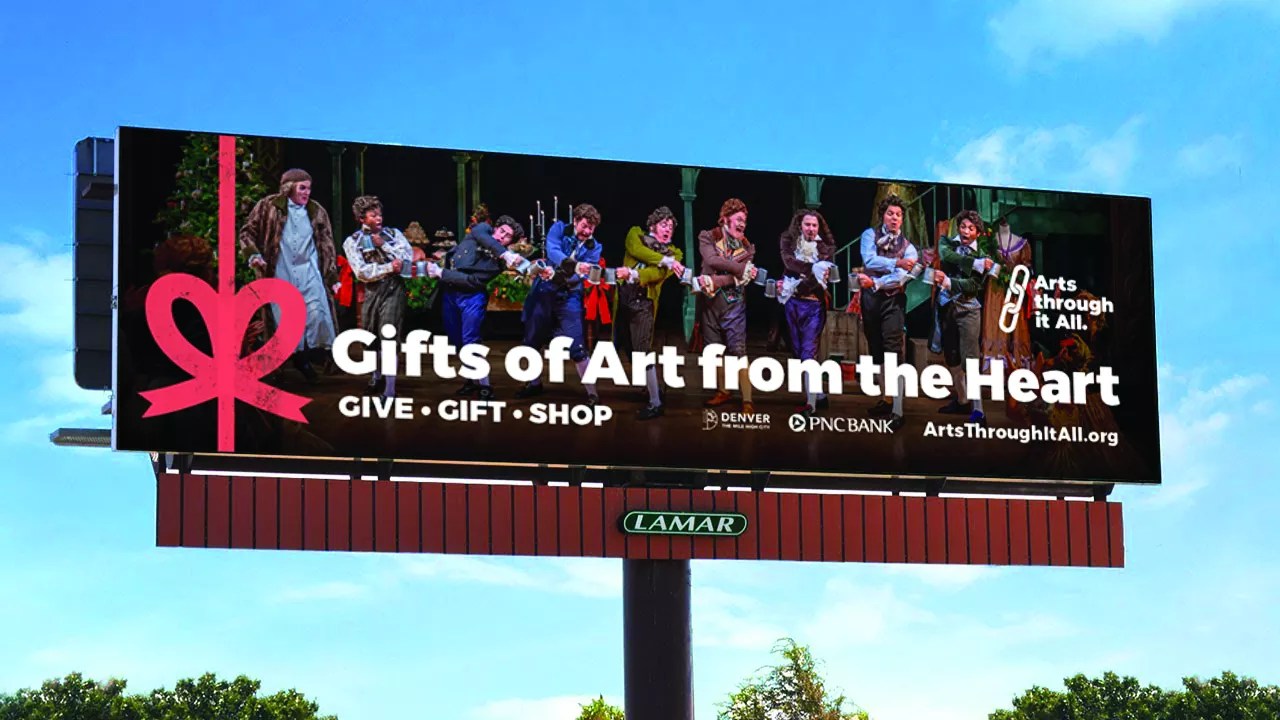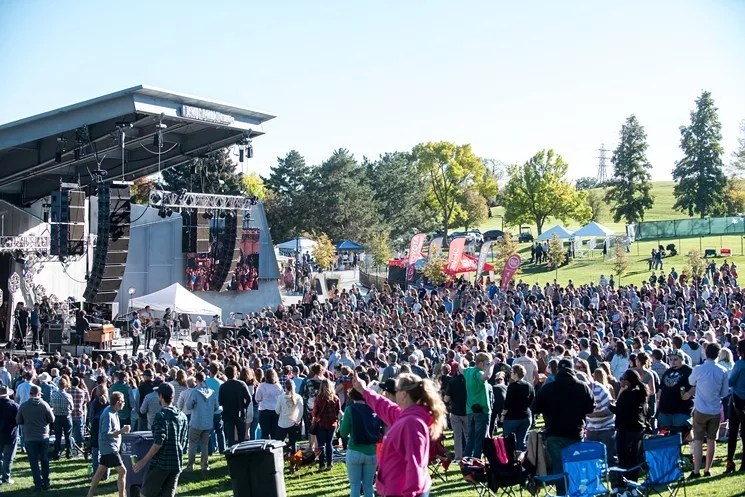
CBCA

Audio By Carbonatix
A brutal new study released December 1 by the Scientific and Cultural Facilities District shows how the pandemic has pummeled cultural nonprofits in Denver and six surrounding counties. In light of the report’s bleak numbers, and with no federal emergency relief for the creative sector in sight, arts leaders are clamoring for people to support artists, small businesses and cultural institutions this holiday season – before they disappear altogether.
The statewide Arts Through It All: Gifts of Art From the Heart holiday campaign, headed by the Colorado Business Committee for the Arts, offers the public three ways to help the cultural sector through December: “Give! Gift! Shop!”
More specifically, if you were planning to buy tickets to a Christmas performance that was canceled, give the money you would have spent to the company that couldn’t put on the show. Fail to do that, and your favorite holiday production may not be back next year, cautions Christin Crampton Day, head of the CBCA. Also, consider giving people on your shopping list memberships to cultural institutions, subscriptions to future seasons, sign-ups for classes and workshops, or gift cards. Abstain from Amazon, and instead buy your presents in person or online locally from artists, small businesses, galleries or arts organizations that are sinking fast.
“I think it’s going to be a challenging and long winter for these cultural organizations,” says Ginger White, head of Denver Arts & Venues. Her agency itself has experienced drastic cuts to its budget and staff since revenue from events at Red Rocks Amphitheatre, the Denver Performing Arts Complex, the Colorado Convention Center and the city’s other venues largely dried up. With indoor events prohibited and outdoor events all but impossible to plan for in the face of freezing temperatures, many groups that managed to host limited performances with reduced audiences over the summer will have to go entirely dark. That makes the cold months ahead harder on performing arts groups than anything they’ve experienced so far.
And the eight months since March – when an ever-shifting series of COVID-19 restrictions began – have already been torturous. Michael Seman, a researcher with Colorado State University, co-authored two devastating studies this summer, one looking at COVID-19’s impact on the state’s creative economy and the other on how the pandemic has hit Denver’s live-music industry. He sums up COVID-19’s effect on the cultural sector as “total carnage.”
CBCA launched the Arts Through It All campaign back in April. The holiday version of the campaign is funded by CARES Act money from the City of Denver, Denver Arts & Venues, Adams County, Boulder County, the Bonfils-Stanton Foundation and PNC Bank, among others. The money will pay for TV spots, billboards, social media posts and more to remind people to support cultural organizations.
“The holidays are a time when there are many arts traditions – taking kids to see The Nutcracker or going to see A Christmas Carol or live music or Cleo Parker Robinson‘s Granny Dances to a Holiday Drum,” explains Crampton Day. “This is the year where many of these organizations have had to go completely dark or had very limited capacity. … It wipes out their earned revenue, and this has been going on for months and months.”

Granny Dances to a Holiday Drum
Stan Obert
Through the Art Through It All holiday campaign, says White, “what we’re trying to do is create a vehicle so the arts endure.”
Whether those efforts will succeed is very uncertain, considering that dozens of groups report that they may be forced to close permanently in the weeks to come. For months, arts leaders have been boning up on how to responsibly dissolve or merge organizations, so that they can bow out as tidily as possible if they can no longer afford to exist.
Though no SCFD-funded group has closed permanently since the beginning of the pandemic, the tax district’s new study reports that the end is in sight for many. And for-profit music venues, including 3 Kings Tavern, Live @ Jack’s and the Zephyr Lounge, have already closed their doors.

The Zephyr Lounge was at 11940 East Colfax Avenue for almost 75 years. Now it’s gone.
Brandon Marshall
“We see all the organizations under threat, but there is an immense amount of threat to the performance arts organizations because they are totally shuttered,” says Deborah Jordy, head of the SCFD. “From Centennial to Boulder and Brighton to Golden, organizations are suffering through the district.”
For proof, check the SCFD’s COVID Impact Survey, which looks at the state of cultural nonprofits from April to September. Of 300 SCFD-funded nonprofits, 244 responded to the survey, and their answers demonstrate that the financial impact of the virus has been moderately to extremely severe.
For 60 percent of the groups, earned revenue loss – money from classes, events, workshops, online exhibitions, etc. – has been significant to near total. Around a third of the jobs in these nonprofits, which employed approximately 12,400 people in 2019, have been lost to layoffs, furloughs or elimination. Of those, 542 positions were eliminated entirely.
Around 75 percent of those surveyed were only moderately confident or not confident at all that they would survive. Donations from funders are down (and corporations and foundations had already cut back cultural funding in recent years even as the sector grew, according to a separate CBCA report). Nearly half of the organizations have just four months or less in reserves to keep going.
There is some good news from the SCFD, however. Earlier this year, the tax district predicted that it would only be able to grant around $40 million, based on projections that spending would be down. But shopping has been surprisingly strong considering the region’s economic woes, and more spending means more sales tax, which means that the SCFD has more to give.
“In 2019, we made grants and distributed $65 million,” says Jordy. “That’s huge. Although tax revenue may be down this year slightly…we are distributing money to a lot of organizations. At least they have that base of support. We are on track, based on our model, to distribute and grant to all SCFD organizations this year close to $60 million.”
Regulated by state statute, the SCFD does not have flexibility in how it uses its budget to allow for emergency spending. Still, the organization is working to mobilize other funders to step up, and plans to continue to offer sizable support to struggling organizations, from tiny Tier III groups like Access Gallery, whose funding is determined by county cultural boards, to the five Tier I juggernauts, including the Denver Museum of Nature & Science and the Denver Center for the Performing Arts, and everything in between.

Don’t be a Scrooge this holiday season.
AdamsVisCom
And there’s another silver lining. Jordy continues to be heartened by organizations experimenting with virtual content, and hopes that even after live events return, they will continue to make more programming available online.
“Organizations throughout the district have done a fabulous, bang-up job pivoting to virtual, online programming,” she explains. “They got in there and started putting up performances, offered online classes, music classes, painting classes, which was fabulous. What I think is so valuable is that it provided visibility so organizations could stay public so people wouldn’t forget about them…and it provides access to the public.”
Adán de la Garza, head of the donation-based experimental motion-media series Collective Misnomer, was one of the first to start offering online events after the initial shutdown. But over the past eight months, he admits, his series has had more luck bringing in online audiences than revenue; he’s considering shutting down after a scheduled December 18 screening until live events can return.
De la Garza worries that some groups feel pressured by funders to present works online, even when they’re expensive to produce and audiences don’t show up – or those that do show up resist paying. The SCFD study notes that 74 percent of the cultural groups have been only moderately successful or not successful at all in increasing online engagement, and that 75 percent have had only moderate to no success earning revenue for online offerings. Even when patrons tune in watch, they don’t necessarily donate.
Some cultural organizations that have experimented with online events have found that the platform levels the playing field between massive organizations and smaller groups; many nonprofits have discovered that they are increasing engagement from around the globe – but not increasing support within the region.
“It’s exciting that it is democratizing the arts in a way with free programming to people from all over the world,” Jordy says. Still, staring at a screen is not as engaging as sharing physical space and cultural experiences.

Thaddeus Phillips in Zoo Motel, Buntport Theater’s latest virtual offering.
Rafael Esteban Phillips
“The beauty of the arts is that people like to be together. You like to have that armrest in between you and the person next to you,” Jordy says. “It’s that kind of stickiness we love with performing arts.”
That collective experience is not guaranteed, though, if people don’t support the groups they love now – and arts leaders hope the Arts Through It All campaign helps people see the economic and social crisis that will result if the creative industry cannot rebound from the pandemic.
Chris Zacher, head of the SCFD-funded nonprofit amphitheater Levitt Pavilion Denver and co-captain of the Colorado chapter of the National Independent Venue Association, has been championing the Save Our Stages and RESTART acts, which, if passed, would bring some federal relief to the live-entertainment industry.

Levitt Pavilion officially canceled its 2020 season.
Jake Cox
“The industry is on life support,” he says. “Unfortunately, the federal government has been too slow to act on an additional relief package, which is desperately needed to save our music ecosystem. … The industry is desperate for relief.”
And with partisan gridlock continuing to hamper relief efforts, the soonest that industry insiders project new federal aid coming is late January – and that’s far from a sure deal.
In the meantime, it’s up to corporations, foundations and individuals to do what they can to stem the bleeding in the cultural sector if it’s going to survive. “The general public doesn’t think about the arts as an industry sector and how important it is to the economy. They think of it as a nice thing to have,” says Crampton Day.
“Don’t take for granted that the arts are always going to be there,” she adds. “I think a lot of people take for granted that they’re going to be there. As a community, we have to do what we can do to step up.”
For more information about the Arts Through It All campaign, go to the CBCA website.